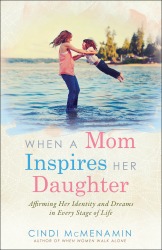Reframing What 'Drives You Nuts' in Marriage
I "met" Laurie Wallin on a post at The M.O.M. Inititative, and had to laugh when I saw the title of her book, Why Your Weirdness Is Wonderful. My kind of author, I thought. I asked Laurie to share two posts. This first post, a Marriage UPGRADE, addresses how we can deal with "quirks" in marriage.
"When our quirks clash with someone else’s," Laurie said, "asking the right questions can take that relationship beyond survival mode to thriving mode."
A personal story about burned biscuits come to mind, but I [Dawn] will save that for a post of my own. Suffice it to say, I had to learn to dwell with my husband according to knowledge, and learn how to be kind and prudent! (Ephesians 4:32; Proverbs 8:12)
Laurie continues ...
Years ago, my husband walked into the kitchen when he got home from work and said something that  almost blew up our marriage: “Honey, let’s rearrange the kitchen cabinets. What if we put the glasses in this one? And—”
almost blew up our marriage: “Honey, let’s rearrange the kitchen cabinets. What if we put the glasses in this one? And—”
The spatula whizzing by his face interrupted him.
Wiping my hair out of my new-mom, when-was-my-last-shower face, I took mental inventory: dinner on the stove, preschool World Wrestling Federation ensuing, a crying baby wrapped in a sling around my torso, and the man wants to add a task to my life? His suggestion seemed so insensitive, so clueless, so hurtful to a mom of two then foster kids who was still trying to figure out which way was up.
It was that tense place where my love for knowing and living our personal strengths was born.
On the recommendation of a friend that same week, I’d done some reading and work to figure out my strengths. And that’s when the miracle happened: I realized my husband must have strengths too! (Yeah, I know. How can that be, with the comment about the cabinets?)
But it was true. And that moment—that realization—saved my marriage. It opened my eyes to the two questions that can make any relationship great:
- What strength is my partner trying to live right now?
- How can I see it so we’re on the same team? (What did that look like practically?)
To start, I had to figure out which one of my quirks was annoyed at which one of his. By following my resentment trail, I found the culprit. Each time he brainstormed ideas and shared them with me, I was automatically thinking, I have to do that. Right now.
That response revealed the offended quirk: my “get ’er done” strength. It was mistranslating his think-of-ideas strength as a demand and a plan of action. On top of it all, my make-a-difference strength was offended because when he offered a suggestion for organizing the kitchen, I was hearing that as “You aren’t a good organizer for our family.”
From there, away I went on the crazy train!
That’s where the second step came in. I asked myself, How can I see it so we’re back on the same team? Even asking the question put me in a posture of noticing and working with our commonalities instead of being run over by our differences. Turns out if I asked him, “Is this a fully baked [that is, get ’er done] idea? Or is it still pondering?” his ideas didn’t get on my nerves nearly as often!
It shocked me how many times he answered the latter, and I realized how often my get-it-done assumption was getting us in trouble. Over time, I learned to relax when he thought out loud, to see it as his mind and heart working as God designed: a beautiful gift of creativity and imagination.
When our quirks clash with someone else’s, asking the right questions can take that relationship beyond survival mode to thriving mode.
Next time your spouse’s quirks rub you the wrong way, isn’t it worth holding off throwing that spatula long enough to ask these questions that help the “yours, mine, and ours” weirdness to be wonderful together?
Which of your spouse’s quirks most often clash with your own? How might you use the questions above to shift from “me versus you” to “us versus issue” next time conflict arises?
NOTE: To enter a 5/16/14 drawing for Laurie's book, Why Your Weirdness Is Wonderful: (1) Share how God helped you overcome your own marriage quirk ... OR (2) share how you and your spouse (or co-worker or friend) learned to operate in each other's strengths (for better teamwork).
Laurie Wallin is a Christian speaker and certified Life Coach. She's helped women worldwide regain joy
 and confidence by letting go of energy drainers and using their God-inspired strengths. Her new book is Why Your Weirdness Is Wonderful. Laurie, her husband and their four daughters make their home in San Diego.
and confidence by letting go of energy drainers and using their God-inspired strengths. Her new book is Why Your Weirdness Is Wonderful. Laurie, her husband and their four daughters make their home in San Diego.
 Post a Comment → Posted on
Post a Comment → Posted on  Tuesday, May 13, 2014 at 7:00AM
Tuesday, May 13, 2014 at 7:00AM  Cooperation in Marriage,
Cooperation in Marriage,  Laurie Wallin,
Laurie Wallin,  Marriage,
Marriage,  Spouse's quirks,
Spouse's quirks,  Upgrade with Dawn,
Upgrade with Dawn,  Weirdness is Wonderful Upgrade Your Life
Weirdness is Wonderful Upgrade Your Life  Attitudes,
Attitudes,  Marriage,
Marriage,  Relationships
Relationships 













